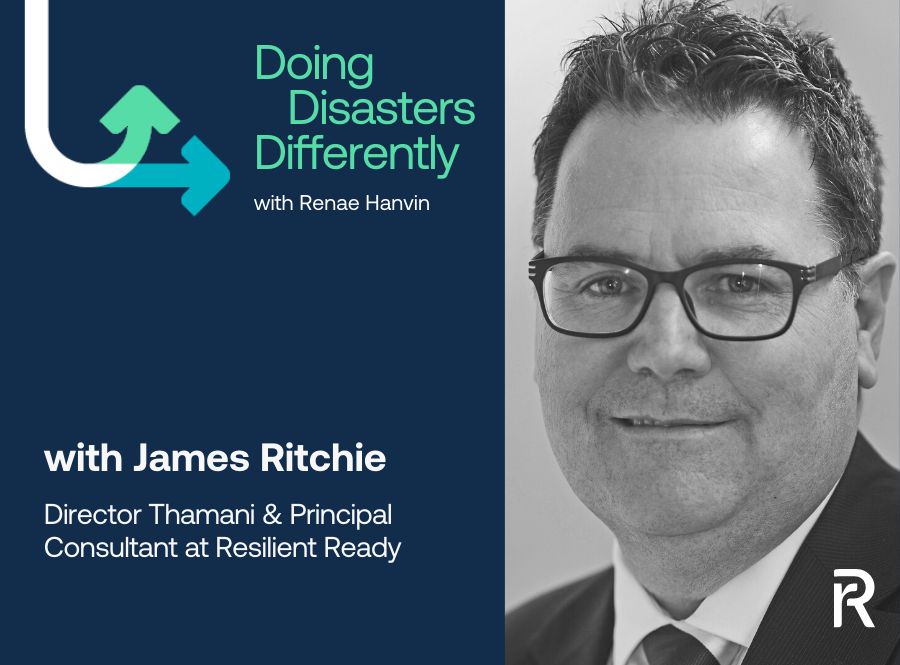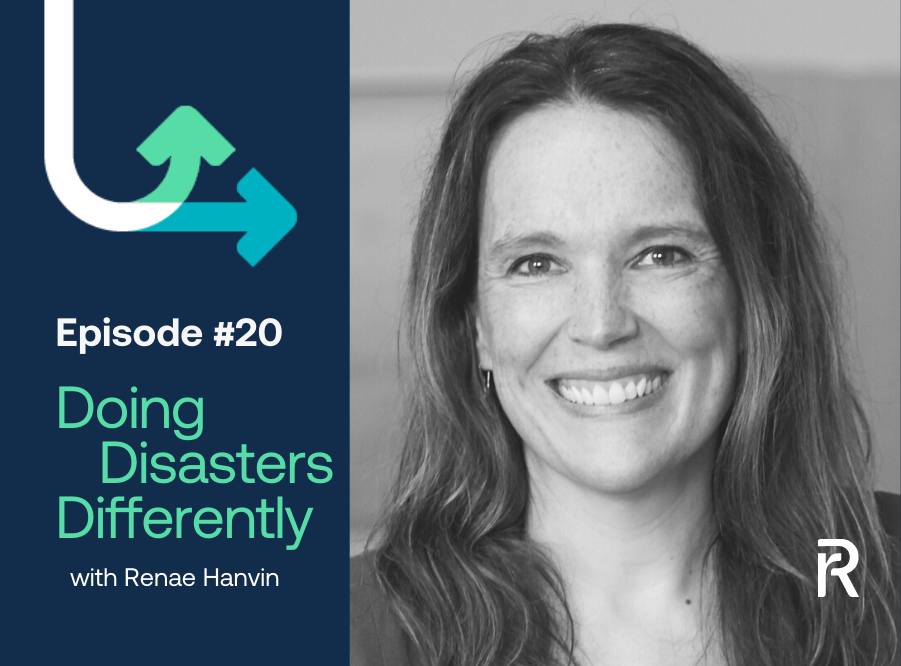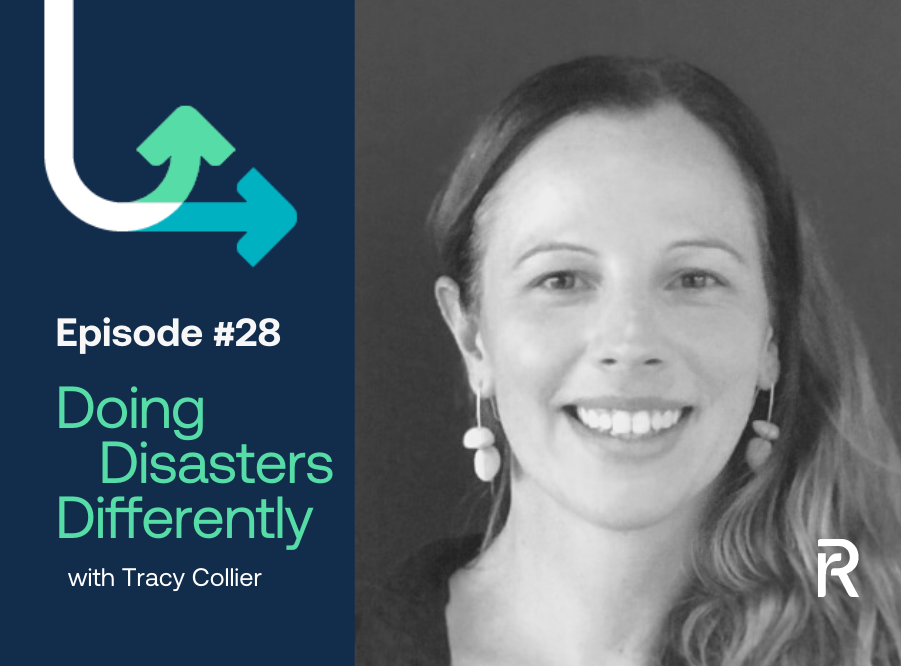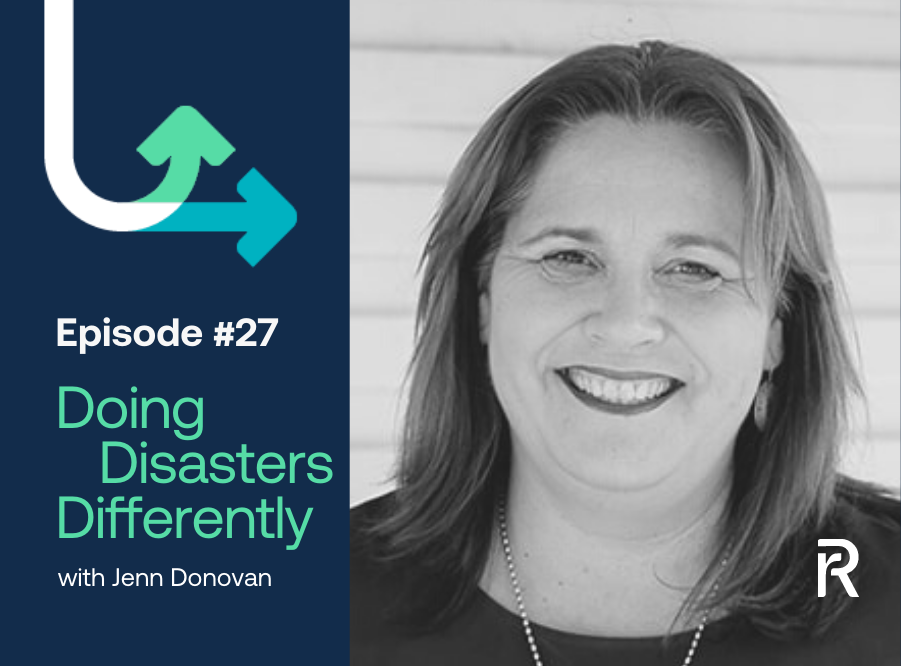
This episode
In this episode, Renae is talking with James Ritchie, the Director of Thamani, a Principal Consultant with our C2C collective. He is currently located in Germany and has just come out of a 200 day lockdown.
As the strategic adviser to C2C and an International Resilience Advisor for the European International Resilience Advisors Network, he is the perfect person to give us his perspective on lockdown. They will discuss resilience as James shares with us his experience of the pandemic from the other side of the world.
key moments from the conversation
James brings diverse senior executive leadership experience from the public, private and not-for-profit sectors. He has previously worked in senior positions across diverse sectors including International Development, Environment, Water, Australian State Government Public Service, Community Mental Health and Mining Sectors.
James has held various disaster preparedness and emergency management responsibilities across his career, in particular executive accountability for fire and flood response, counter terrorism planning and emergency evacuation.
James and I met about 8 years ago in the disaster space when he was presenting at a course I attended. We connected and have been working together in various ways ever since. When I had left Australia Post and was consulting to EMV I was mapping out the C2C concept and asked James for his thoughts.
And five years later we’re still having similar conversations today!
Renae Hanvin
So, you have just come out of 200 days in lockdown.
1. How does that affect your mind, your body and your work?
James Ritchie
I must admit, it has been an interesting time for me personally. This has been our third lockdown but our longest one – 200 days. Over the Christmas period, we had a slight little reprieve. But our lockdowns have been very different to say Melbourne’s lockdowns, but they still take a toll. There’s a term going around “the psychological field of languishing” and, that actually depicts me quite well. And sometimes I feel I’m just languishing while doing stuff and it makes it very hard to focus. And the questions of, ‘what’s next? How does it work?’ For me, I’m finding the stress of the lack of social engagement difficult. As you know, I’m a very social beast. It plays on me quite a lot. One of the things I’ve done is set up, both in a work sense and in a private sense, lots of times where I catch up with people on social media. Whether it’s talking to you, or others, I’ve got two or three people across Europe who I have a weekly meeting with. It’s a work meeting in a sense, but it’s just chewing the fat meeting. It’s not talking about any prototype project – it’s just talking about stuff so we can feel connected with each other. And I found that to be helpful. When we can, I always go for a walk a couple times a week. Luckily, we’re now starting to come out of it with summer coming. But it does play in your mind, especially when you’re remote in another country.
Secondly, it’s the language. If German isn’t your first language, trying to find information can sometimes be difficult. I listen, on mute but in English here is the news. And it becomes slightly depressing when all the information you watch, in your own language, is bad news. So, I’ve worked out a way to actually mitigate that by watching other things and doing activities outside. We live in an apartment downstairs and we’ve got a family upstairs. And because we’re in the one building, we are allowed to socialize. One of the best things we’ve ever done. There are three young active kids upstairs, and my duty in life is to make them more Australian.
Renae Hanvin
Love it. And I think you mentioned yesterday that the little bakery next door is starting to bring outside chairs and tables out the front. So hopefully, as you evolve into spring and summer, then outdoor living will become normal. I obviously shared in the introduction that you’re currently living in Germany, unable to return to Australia because of COVID since it took over the world.
2. What’s been your experience of the pandemic from the other side of the world? And, what’s Germany doing different or better than Australia?
James Ritchie
It’s been interesting. Because it has been a long, long haul, none of it is easy in different phases. I’ve got positives and negatives. The difference here with Germany is the way that they have made decisions initially was very good between the 16 states. The way they progressed that, particularly in the first few months of last year, they did that really, really well. They got it set up and it was sorted. And I must admit, one of the things I’ve been really impressed with is having a leader like Angela Merkel, whether you like her politics or not, she’s coming from a scientific background. The way she communicates with people is way better than what I see in other parts of the world. And she’s done a very good job of communicating some of that stuff that I think other governments have struggled with. And then there’s some things they’ve done really well here are things like, you know, you can go and buy what they call a ‘Schnell test’, which is a fast test you can have at home. So, if there’s an opportunity to visit one other family or have a visitor come here, you’ve got a Schnell test at home so you can test just to make sure everything’s okay. We’ve got literally small little places where you can register and get your test done officially. Hairdressers for a while here were closed. When they opened you had to take a signed off test with you. So, they have all these little places around the suburb where you can go get tested easily and quickly. And that’s been good.
Vaccinations, on the other hand, have been a bit of a problem. But that’s a global issue – not just here. I think originally, they started collaborating with other countries across the European Union for the first two or three months, but they suddenly realized how silly that was. I mean, they’ve been moving patients from Czech Republic, from France, from Belgium to Germany by train, plane and helicopter. And they’ve been using their assets as the Germans have a great health system and lots of capacity. So, they’ve done that type of collaborative work very well.
Renae Hanvin
When we talk about resilience and we’re talking about the ability to adapt, and whether that is to spring back to what it was, or into something else.
3. Is the German culture, the systems and the structures more resilient than here? Or even, have they become more resilient, just as in terms of how they’ve been dealing with COVID?
James Ritchie
Two really interesting questions, because you have to remember the different cultures here – we’ve got 16 states, and even they’re quite different. They’re very old. You walk past the buildings here, and some have been built in the 1500s. Compared to Australia, even though we’ve got a long indigenous history, the built environment has a long history here. But, from a people’s point of view, they have become quite resilient because they’re process-driven. They have slightly started to struggle with things out of the normal sequences as the Germans are particularly not fans of the unexpected. They are very bureaucratic, which has its upsides and downsides in becoming resilient. I do think lots of the leaders have learned a bit more about how to make Resilient Cities. I think it’s focused and more. The big thing that they do here in a resilience sense is the route to the regions, the states, the federal, and even across Europe. They are thinking about strategic risk very differently than Australia and strategic resilience very differently. The programs they’ve tried to put together that strengthen resilience across the whole of Europe. Sure they’re big, they’re bureaucratic, some might say painful at times. But, this strategic intent of how they tried to join the dots and trying to get the cohesion between different policies. They see resilience in the environmental policy, they see resilience in the energy policy, they see resilience in the social policy, they see resilience in the justice policy. They are trying to solve those issues perfectly now. But as I said, I think strategically our intent is far more advanced than what I’ve seen in other places.
Renae Hanvin
4. Where do businesses play in that? You’ve spoken a lot about the government but, has there been a role identified in terms of how corporates or other businesses can play in that resistance level?
James Ritchie
Well, you and I both know, something we both are passionate about is the role of businesses. I think, across Germany, the role of businesses has changed, particularly in the last couple of years. These, I think, are very similar to Australia, it’s like the forgotten stakeholder in some ways, or they tell us what they want when they want to tell us. I think COVID has brought that together- supply chains, logistics, some of the risk issues for them as businesses, how do we adapt etc. I’ve seen a change in the role they play. And it’s interesting, some of the programs have to go down to a much deeper level. Things like the Sustainable Development Goals, or the Disaster Risk Reduction framework, I would have more chance of talking to a business here, whether it’s a big corporate or a small-medium enterprise, where they know what that means. They know what that means to their business, or what it could mean is an opportunity for their business. People are even talking about it, even the local bakers are trying to think about how they can become more sustainable. They are also making business more resilient – plans for when they can’t get people or they can’t get products, or they can’t get supplies. It’s a different conversation now than it was 18 months ago.
Renae Hanvin
And I guess as you mentioned, we have a really exciting initiative coming soon, which hopefully will put resilience as an everyday business conversation in the hearts and minds of all businesses across Australia. So, stay tuned, everyone for that one.
5. Now you are on the Australian Institute for Disaster Resilience working group for a new handbook in risk reduction, which is so fantastic to have you on that. I’m such a big fan of the handbooks that come out of AIDR. So, can you tell me a little bit about that? And what’s going to be in it and who is it going to be for?
James Ritchie
I think it’s a great initiative. Its premise is about changing the mindset about how do we deal with disaster and disaster risk? How do we embed resilience in there? I think it’s actually a really good process. I think the target audience is every business leader and every leader and I think it’s very important that we have these tools. Everybody’s coming from a different starting point. There have been people that live and breathe emergency management, disasters, risk resilience, but there is a whole lot of people that are just new to this. So the question becomes – how do I embed this into my business planning? How do I embed this into my head? What’re the differences between business continuity and business resilience? What does that look like for me as a business leader? I think that’s the journey that is going on. I think it takes some time to get that information about being a really good toolkit and information source to build capacity and build the way forward for people to engage. For me, it’s also about how do we get better engagement? How do we get better structures? How do we strengthen resilience? As I said, I agree with you Renae, in that we often have a definition of resilience as our ability to spring back. I can sit there and say no, no, no, the resilience is twofold. But, it’s about how do we stop the spring from being broken beforehand? And then, if we are impacted, how do we minimize the spring being under pressure for too long? It’s a continuum that we need to change the definition of resilience, and think about it in a very different way. And, how do we build that into our business and business strategies, business planning? Because as you and I have spoken many a time, they are the forgotten stakeholders, but they are pivotal to survival for communities.
Renae Hanvin
I agree 100%. I always say that businesses are our national assets that are completely misunderstood and underutilised. What’s great about you, and I’ve been part of a handbook on stakeholder engagement and ensuring that businesses as a stakeholder group were included in that which was great, but having your expertise in your role. As an international resilience advisor in the European International Resilience Advisors Network, the intel that you’re going to be able to bring in, the expertise, the experience and the insights as well, which is knowledge and capabilities that we can benefit from in Australia as hopefully, the handbook is part of or, one stepping stone towards some multi-stakeholders better understanding risk. As well as being able to drive behaviour change, and mitigate so that we have better outcomes. Now, you obviously are a big part of the C2C collective. And we’ve been working together for a few years now and currently, you’re working with us remotely to deliver our solutions for building resilience in Australian communities and businesses.
6. How do you think Australia compares to the rest of the world in our resilience mindset?
James Ritchie
Wow, that’s a big question. I’ll answer it in two ways. I think Australia’s bench strength is very, very good. However, I do not think we’re prepared for the world of compounding complex disasters, continuing the way they have done for the last couple of years. They are going to continue. I think in a resilient space, we’re quite immature in that we are still thinking about built infrastructure way too high. Then we’re thinking about the cultural mindset. How do we bring communities with us? How do we strengthen resilience through people, not politics? How do we get better engagement to solve the real issues and not just a new piece of kit or a new building? I think it is about a whole-of-Australia response. I think we all have to get there. And that is that our culture has to be different. We have to think about leadership differently. We have to change our models of risk. We have to change our models of decision-making, consequences management, we have to do things differently. There is no doubt about it in my mind. Now having sat in several different jurisdictions, we have to think more strategically about resilience. And then how does that impact, particularly government, how does that impact long term policy? And how do we then support that transition as practitioners and people in this sector? How do we bring all of the stakeholders in but also the forgotten ones, the business ones and the corporate ones? Not just as a funding mechanism. How do we do things that make a difference for vulnerable communities and reduce the impact of disasters but also, strengthen our resilience at every level? Whether it’s the individual, the community, the family, the business or the social club. It’s the fabric of our existence wherever we’re living and, I think, it’s a really big challenge. I hope Australia’s ready for that because I think it’s going to need to be if it wants to see itself as a player in the future of minimizing the risk and maximizing resilience in our communities.
Renae Hanvin
Yes – it’s fundamental. There can’t be a better time than now to break the cycle. I’ve been involved in quite a lot of conversations recently relating to the new Australian Federal Agency about recovery versus resilience. We continue to wait for the disaster then recover. If we don’t break the cycle, then it’s never going to change. And it’s up to us, as the people, to break the cycle. Which is obviously what we’re aiming to do. And I think it was actually Mark Croswell who said to me four years ago, that I was four years ahead of the time. And I have to say, James, I might have to ring him up and tell him that he was correct.
James Ritchie
I think that is spot on. And, if you think about where the world is heading, if we don’t get a handle on what resilience is and what it means to us. And more importantly, the opportunity for us. I get really annoyed because we often see the downside of risk – we can do this, we can’t do this, that’s going to kill us or that’s going to hurt us. But this is the right time for the opportunity to make resilience front and centre. Everybody’s worried about the long-term budgeting pegs. In the long run, this saves lives, saves money, is more efficient, and has a better outcome. If I put all those together, why wouldn’t you do it?
Renae Hanvin
Correct, I totally agree. Now talking about the new federal agencies. You’ve been through the experience of both of us presenting resilience solutions to all levels of government over many years. And obviously, we put in a submission to the Bushfire Royal Commission. You know how excited I am about the new Federal Recovery and Resilience Agency. There is finally a place in the federal government that owns resilience.
7. What do you think is possible from this agency, versus what do you think will be the reality?
James Ritchie
To put, particularly resilience, in an agency and centralise that in some ways, is a perfect opportunity to be the catalyst and the driving force to embed resilience as a mindset. And then, support all parts of resilience. Whether it’s social capital, whether it’s community or people-led change or reform, and whether it is also infrastructure, initiatives, all those things. It needs the cultural change that will send the message to all stakeholders. This is a new game we’re in. And this is a new purpose – we’re here. For me, our vision is to make Australia more resilient and also have the capacity to recover when and if we’re impacted. My great concern is they don’t take up that opportunity. That’ll be disappointing if they don’t, I think it is being set up in the right way at the moment. And I think they’ve got great opportunities to do that. We just need to get the right people, in the right room, doing the right things. They are primed to make a massive difference to how Australia operates from a resilience perspective. But, the impact of long-term strategic policy on Australia is a great outcome for all, if we can get it together. And I hope they do. And, we’ll be there to support them. I am excited about it and I think it’s one of the best moves they’ve made in a long time.
Renae Hanvin
Yeah, 100%. I’m super excited and have been having some early conversations with those in my network. They’re at the early stages – it formally kicks off from the first of July, but exciting to be able to have some conversations now and see what change we can contribute to as well.
James Ritchie
You always ask this question and I think it’s a fantastic question to ask because, each time you ask, I have some different thoughts. For me, the two things we got to do differently is engagement. I think we’ve had old models of engagement. When I hear other groups of people saying, ‘we’ve really engaged with them’, I say – no, you’ve just communicated with them. We’ve got to build trusted networks. For me, this is the time to make that come alive. When we talk about engagement, communication and trust networks, we have to do that differently. Because it’ll be the thing that will save us. Building on some of the work Daniel Aldrich does around social capital. Those sorts of things are fundamental to getting this right.
The other thing to do differently is to examine the language we use. I’m sitting in a country where English is a second language, and the first language isn’t my first language (German). I’m learning it and I’m coming along but, one of the things for me is language. And it’s not about speaking the same language of English to English, it’s actually speaking the same voice that we understand and listen to each other. I am so over people not listening to communities and people giving advice. It’s a missed opportunity of not understanding the language they’re talking. And it may be the same language, English to English, German to German, but we miss that great opportunity of actively listening to each other and understanding what are they trying to tell each other. And, what do I do with that? And, how do I solve that problem? Instead of just saying – yep. I’m sick of being in meetings with people who say ‘yep, yep’ to me. I sit there and say, ‘stop and listen’. Then put a co-designed plan to make a difference.
Renae Hanvin
Yeah, I remember doing one of my early podcasts with John Blackburn. And he was very much the same about language because it’s imperative that we all speak the same thing and get the same thing from the words we speak. Again, even resilience as a word has so many different levels and meanings associated with it. We need to articulate and ensure that all stakeholder groups see resilience as resilience. And work on that as much as possible so that we can start sharing the responsibility. We know what the responsibility needs to be.
James, thank you so much for your time. I always like having you on the podcast and bringing your insights. So today, I’ve been talking to James Ritchie, Director of Thamani who is a Principal Consultant with our C2C collective and we’ve been talking about his 200 days of lockdown. Hopefully, we can all live out of lockdown soon, but really great to chat with you. And we’ll talk to you again soon.
James Ritchie
Thanks, it’s always a pleasure. It’s always good fun and we are talking about the things that need to be talked about so thank you so much. Have a lovely day and in Germany as they say, Auf Wiedersehen.
Connect with James Ritchie



